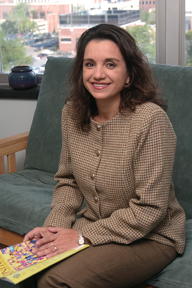The life of Isabel Scarinci, Ph.D., is one marked by community service.
 |
| Isabel Scarinci, a graduate of UAB, has been seeking funding for minority health-related research projects since joining the faculty as an associate professor of medicine in 2002. Scarinci is the recipient of the 2007 Odessa Woolfolk Community Service Award. |
Her mother Amelia showed her the importance of teaching others to take their health seriously when Scarinci was a little girl in her native Brazil. Since then, Scarinci’s life work has followed that same path, motivating people to take responsibility for their own health. She’s done that by engaging the community through the use of behavioral science to promote breast and cervical cancer screening, mostly in Latino immigrants.
Scarinci, a graduate of UAB, has been actively seeking funding for minority health-related research projects since joining the faculty as an associate professor of medicine in 2002. She also has been heavily involved in several state and local organizations whose missions are helping the under-served.
Because of her work, Scarinci has been selected as the recipient of the 2007 Odessa Woolfolk Community Service Award. This award, along with the President’s Awards for Excellence in Teaching, will be presented at the Faculty Awards Convocation Monday, April 23 at 10 a.m. in the Alys Stephens Center Sirote Theatre.
“It’s such a great honor,” Scarinci says of the award. “Community service work. . .I don’t know any different. I grew up in that kind of environment. My mom has always been very involved in the community.”
Scarinci remembers her mother motivating others to take care of themselves and, in particular, talking to other women about childhood vaccinations for polio. Amelia knew first-hand the devastating effects of the disease. That’s because Isabel was stricken with it at 8 months old. “My mother has always been very persuasive, and from her efforts I got involved in the vaccination-awareness campaigns at a very young age,” Scarinci says.
Scarinci came to UAB as a student from Brazil in 1989, despite not yet speaking English. She was mentored by Laurence A. “Larry” Bradley, Ph.D, a professor of medicine in Clinical Immunology and Rheumatology. She says he took a chance helping her and remembers how important that was in aiding her transition to life in the United States.
“I have had good mentors and I think that is another reason why I do what I do now,” she says. “I need to pay back.”
And Scarinci has been doing that in many ways. First, she has obtained NCI funding to conduct studies investigating African-American and Latina women’s beliefs and attitudes regarding cancer prevention. She also successfully used the community health advisor model to train lay Hispanic and African-American individuals in health promotion, disease prevention, adoption of healthy behaviors and development of community resources for improved health and decreased disparities.
“Because so much of my work is community-based, you can’t do research without the service,” Scarinci says. “I believe that first you go and do something good for the community; then when you go collect their data they know who you are and they trust you.”
Scarinci has actively and successfully promoted and established a program to provide low-cost, free breast and cervical cancer screening, follow-up and treatment for Hispanic women. She has done that by building strong and lasting partnerships between UAB, the surrounding hospitals and the community. She has also played a prominent leadership role in establishing the first mentoring program for Hispanic students at UAB, called Manos Juntas, or Helping Hands.
In addition, she also is assuming a leadership role to enhance the UAB Minority Health and Research Center activities for the Hispanic population.
Scarinci serves or has served on numerous boards, including The Women’s Fund of Greater Birmingham, the United Way of Central Alabama, and Oasis — A Women’s Counseling Center.
“If I can help others I will,” Scarinci says. “I’ve been very blessed that I can get paid to do something I really like to do.”